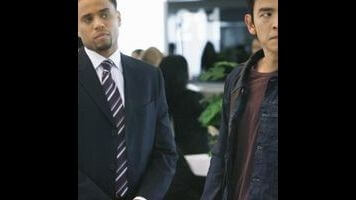FlashForward: "Black Swan"

Every week, FlashForward promises crazy batshittery and ends up turning into a pretty boring police procedural. Then, at the end, it pulls it together for some more crazy batshittery. This week, at least, FlashForward tossed in some random weirdness throughout the episode’s running time instead of saving it all for both of the episode’s polar ends, but that ended up making the procedural stuff seem that much more boring. Again, there was enough improvement over the series’ awful second episode for me to feel justified in saying that I don’t feel like an idiot for hoping it improves, but it’s still wildly inconsistent. It’s the kind of show where, in the course of one episode, a man can anthropomorphize an egg as British, a jazz trumpeter can provide impromptu scoring for a chase through a desert trailer park and everyone can take life advice from a hot, wanna-be terrorist. Crazy, man!
I was talking with someone on the Twitter, our official demon overlord for the year 2009, about how I generally think the series is much, much better when no one is actually talking, and this episode seemed like a perfect exemplification of that point. There were a handful of striking, inventively directed musical sequences. There was a cool question at the center about what one of the guest characters saw in his flash forward. Again, there were some good guest players (someone in the show’s casting department is getting some great actors to play the smaller parts). But most of the time when the characters speak, they’re not even coming close to saying something about their inner lives. Instead, they state, as baldly as possible, either what we can already see on screen or exactly what they saw or think.
Most of the time, the series accompanies someone’s monologue about what they saw in their flash forward – and can you imagine how there would be that ONE GUY in the office in this universe that just kept nagging everyone about what THEY saw in THEIR flash forwards? – with footage of the flash forwards, so the characters are describing everything we’re seeing. It’s a curious artistic choice, one that mostly seems designed to hammer home to the viewers everything so they don’t miss some of it. Maybe the show would move more slowly if everyone just monologued about what they saw, but that would also force the show to figure out exactly how they all feel about it beyond the most cursory of emotions. It’s the difference between hearing how something affects someone and just seeing it happen to them, and it’s also the difference between making strong character choices and defining your characters entirely via what the plot does to them.
That said, the very talented Michael Rymer was at the helm of tonight’s episode again, and he pulled off some really awesome sequences within the show’s framework. In particular, I was taken with three sequences without dialogue, scored almost entirely by music. The first opened the episode, showing how a bustling park collapses into sleep and then chaos at the time of the blackout, all to the strains of Bjork’s “It’s Oh So Quiet.” It’s a fun song but one that’s hard to work into a TV show because it doesn’t really montage well. It calls attention to itself, and it requires footage that matches the vibrancy of the music. Rymer pulls that off here with the colorful glimpses of the part – striking on a show that so often feels washed out – and then the bus trundling across the grass and into the pond at the center of the park. The sequence of the guy swimming out of the bus – it was his headphones Bjork was issuing from – while rescuing the woman was also well paced and shot, and the guest actor was well-chosen. Hell, even his flash forward was well-shot, concealing the essential fact that in the future, the guy was black when he was very much the whitest man to ever have lived in the present.








































